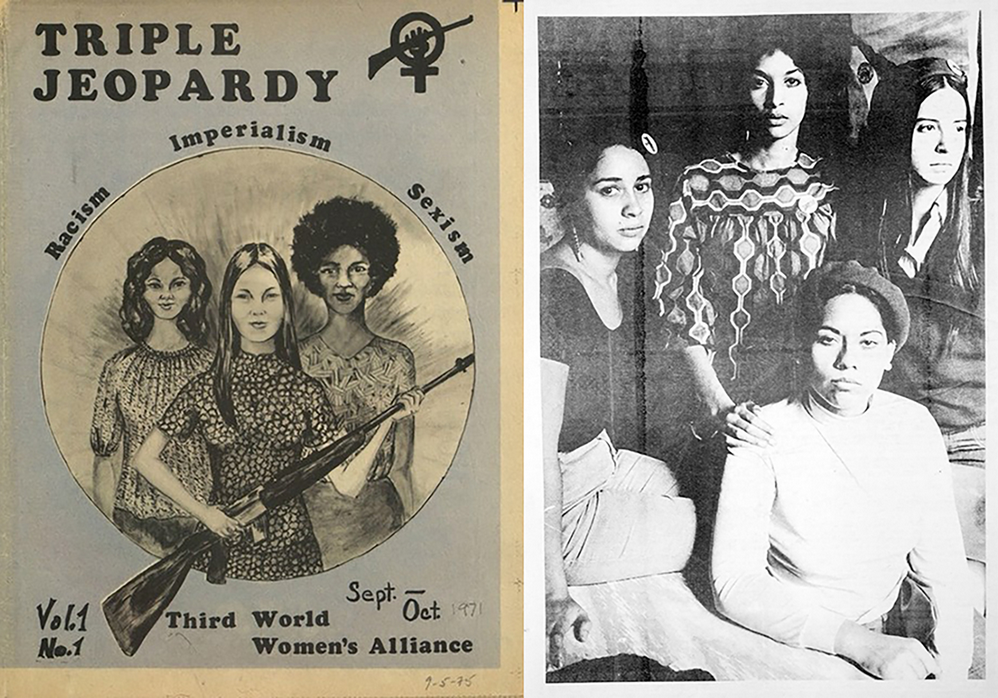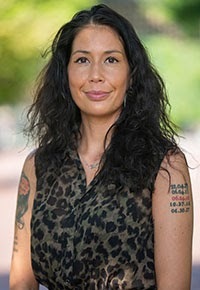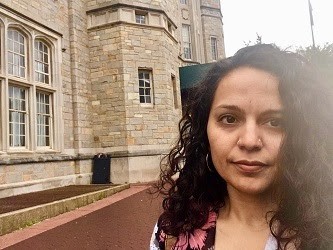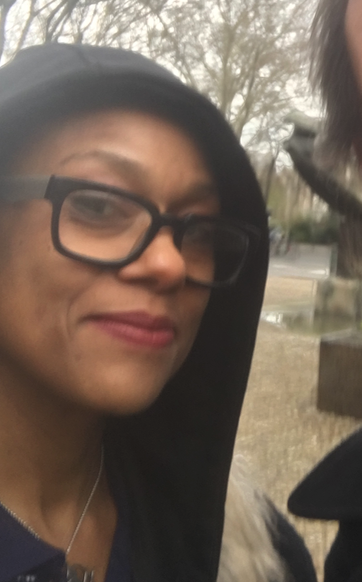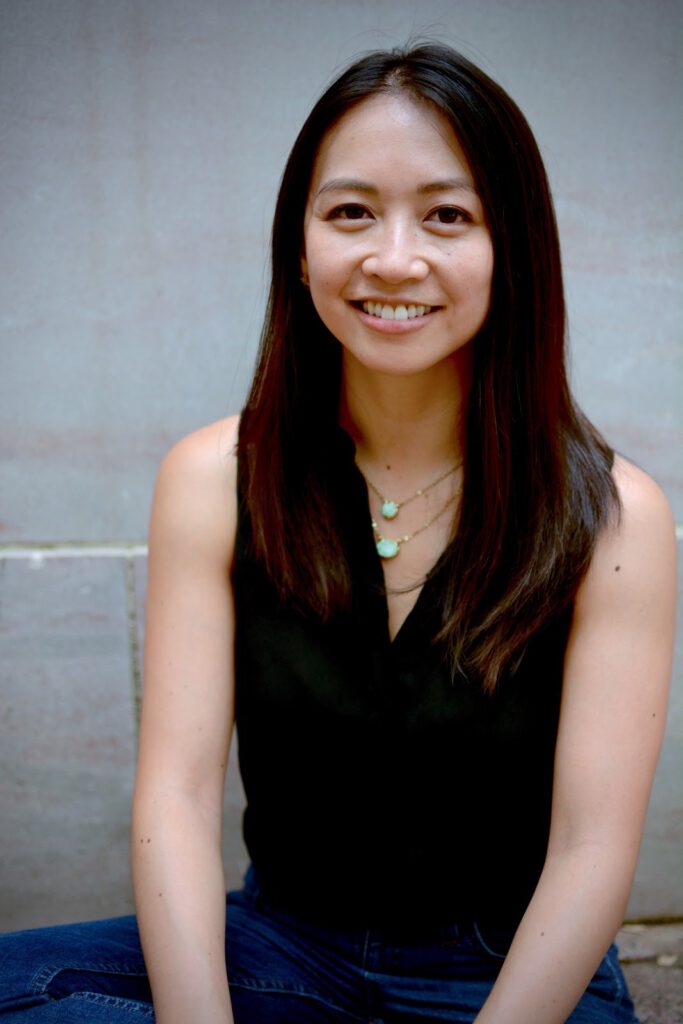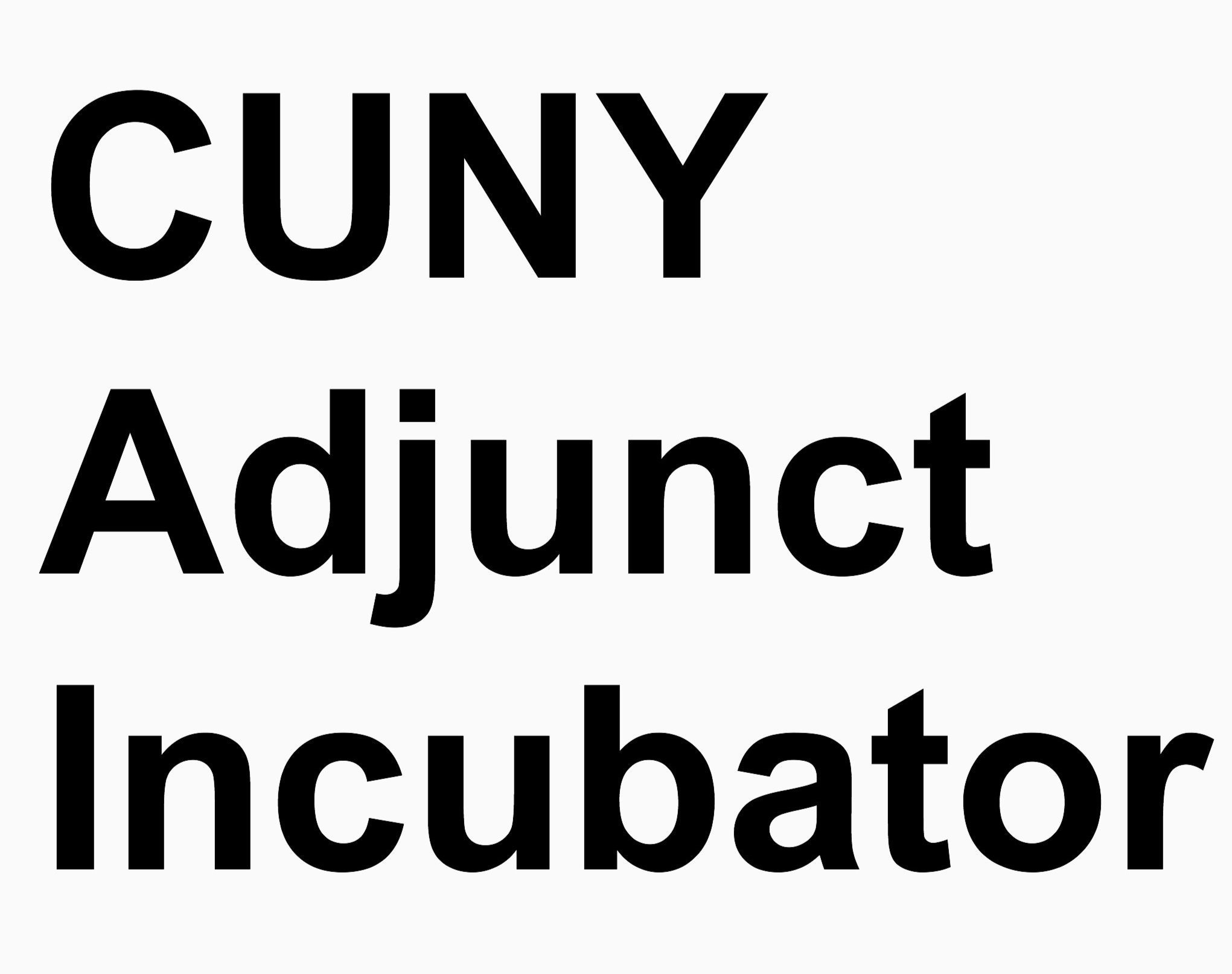Activism in Academia IV: Adjuncts in Dialogue & Action
Fri, Jul 10, 2020
3:00 PM–4:00 PM
Online bi-weekly meetings & presentations. Email to join.

Activism In Academia: Adjuncts in Dialogue & Action is a weekly forum for part-time and full-time faculty to present scholarly and creative works in the humanities and social sciences, as well as share experiences as scholars of color in higher education. It is a radical space committed to anti-racist, feminist, queer and critical race theory that emphasizes the work of BIPOC scholars and theorists and the decolonization of fields that have been predominately white. We are particularly interested in highlighting the contributions of underrepresented populations in academia by changing the demographics and critical lenses of academia. This space bridges multiple divides: full-time/part-time, creative/critical work, scholarly/public audiences, teaching/scholarship. Presentations on works in progress or recent publications, roundtable discussions, and creative performances and readings are most welcome.
We are publicizing the series in order to highlight the strong ties between part-and full-time colleagues’ research, teaching, and advocacy work and to raise awareness around the impacts of issues related to systemic racism, austerity, and job insecurity on adjuncts’ careers, but Adjuncts in Dialogue & Action is a space for having protected, vulnerable conversations. If you would like to be a part of our workshop group, please email Olivia Moy at [email protected] or Lise Esdaile at [email protected].
Activism in Academia IV: Adjuncts in Dialogue & Action is co-sponsored by the
Gittell Urban Studies Collective at the Graduate Center, CUNY, the
URBAN Research Network, and the Center for the Humanities at The
Graduate Center, CUNY.
PAST EVENTS AND SCHEDULE:
The Audre Lorde Great Read
Zami: Talkback & Testimonials
Lehman College, CUNY |Monday, May 17, 2021 at 6:00 – 7:30 p.m.
#CunyxAudre Lorde #AudreLordeGreatRead
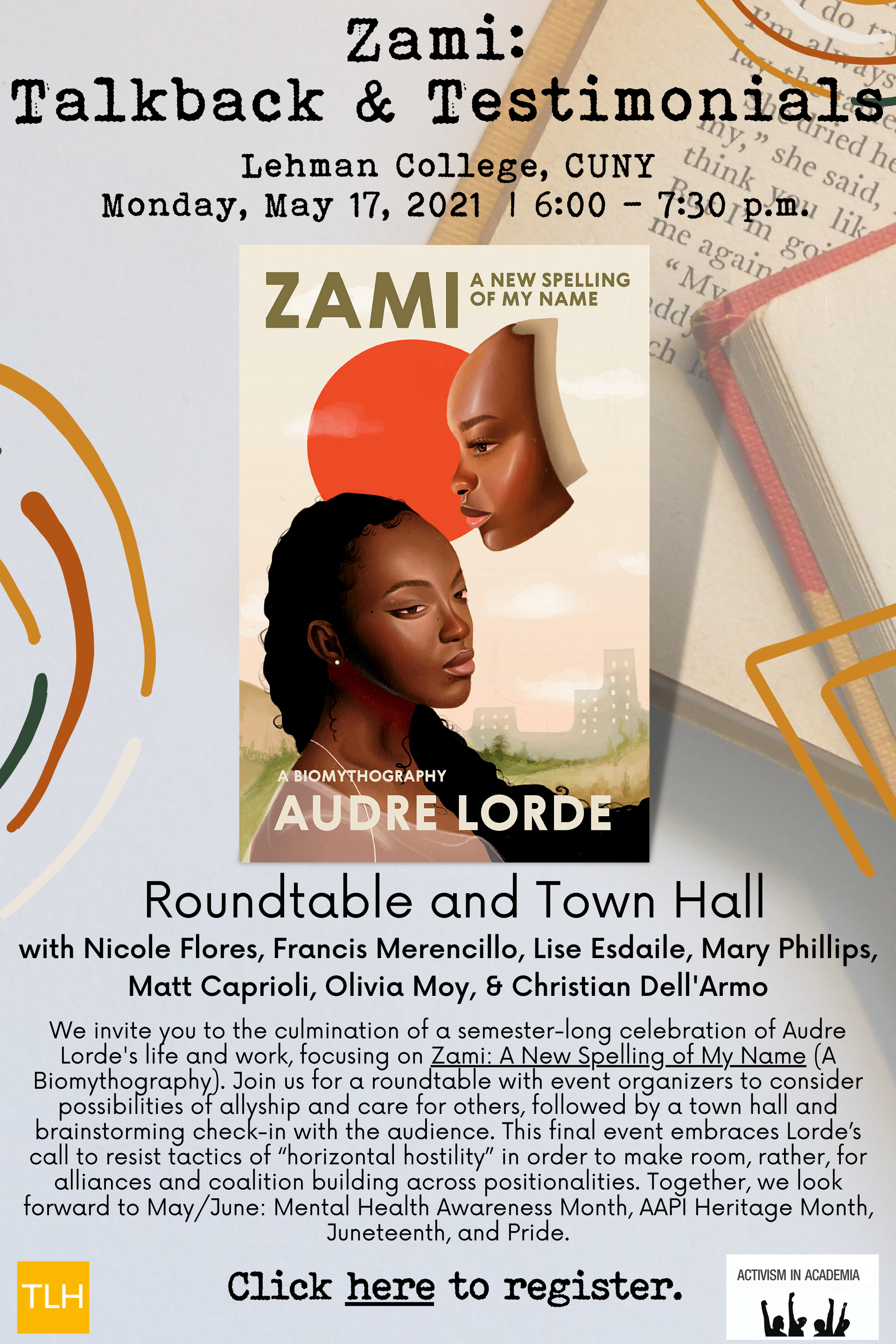
This event is part of the Audre Lorde “Great Read” at Lehman
College and co-sponsored by Activism in Academia and Transformative Learning in the Humanities
We invite you to the culmination of a semester-long celebration of Audre Lorde’s life and work, focusing on Zami: A New Spelling of My Name (A Biomythography). Join us for a roundtable with event organizers to consider possibilities of allyship and care for others, followed by a town hall and brainstorming check-in with the audience. This final event embraces Lorde’s call to resist tactics of “horizontal hostility” in order to make room, rather, for alliances and coalition building across positionalities. Together, we look forward to May/June: Mental Health Awareness Month, AAPI Heritage Month, Juneteenth, and Pride.
6:00-7:00 Organizers Roundtable
7:00-7:30 Town Hall & Check-in
Speakers: Nicole Flores, Francis Merencillo, Lise Esdaile, Mary Phillips, Matt Caprioli, Olivia Moy & Christian Dell’Armo
RSVP here:https://www.eventbrite.com/e/153705381935
Activism in Academia, Spring 2021: Feb. 5 – April 23, 2021, 4:30-5:30pm
This spring, the theme is once again tying activism to our work, with a focus on the creative side. How does our activism intersect with education and our art? Join us for presentations from an impressive slate of international artists.
Previous Meetings:
April 9, 2020: Janine Windolph (Alberta, Canada), filmmaker, The Land of Rock and Gold (2016), Dancing the Space Inbetween (2015) and Untamed Gourmet (2010); Associate Director of Indigenous Arts at Banff Centre for Arts and Creativity. Banff, Alberta, Canada
This talk will draw from her personal journey to reclaim her cultural identity through stories, to encourage communication within her family and community utilizing art, film and storytelling as a way to begin a process for collective healing and providing Indigenous experiences to Canadian history in aim of social change.
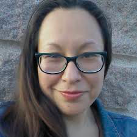
Bio: Janine Windolph (Atikamekw/Woodland Cree) is a Saskatchewan-based filmmaker and Interdisciplinary artist and storyteller. She is the Associate Director of Indigenous Arts at the Banff Centre for Arts and Creativity and was previously the Curator of Community Engagement at the MacKenzie Art Gallery in Regina, Saskatchewan. Her filmography includes roles as producer, director, narrator, writer and/or editor. She directed Stories Are In Our Bones;Lifegivers: Honoring Our Elders and ChildrenThe Land of Rock and GoldAyapiyâhk ôma niyanân “Only us, we are here at home”. She produced From Up North and provided production support and was a storyteller for The Beacon Project: Stories of Qu’Appelle Valley. Janine was a co-producer for RIIS Media Project Inc and co-directedRIIS from Amnesia: Recovering the Lost Legacies that explores the history of the Regina Indian Industrial School (RIIS). This led to the formation of RIIS Commemorative Association, Inc. and as president, Janine helped the organization achieve municipal and provincial heritage designation. Janine has volunteered for Saskatchewan Filmpool Cooperative, mispon: A Celebration of Indigenous Filmmaking, Common Weal, and Reconciliation Regina. She is currently providing production support to the Buffalo Mountain Video Project that is part of homeschooling for her two teenage sons. She is currently a volunteer board member for Prince’s Trust Canada.
March 12, 2020: Lola Lafon (Paris, France), novelist, Chavirer(2020), Mercy Mary Patty (2017), The Little Communist Who Never Smiled (2014), We are the Birds of the Coming Storm (2011); and Une fièvre impossible à négocier (2003)
In this talk, Lafon discusses her latest novel Chavirer and how feminism impacts her writing, her work with youth, and their political reception of her novels.
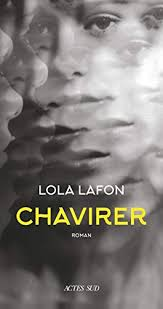

Bio: Dancer, singer (Une Vie De Voleuse), novelist, and activist Lola Lafon, one of France’s most accomplished living writers, was raised in the equally diverse cities of Bucharest, Sofia, and Paris. Her four novels have been nominated for several French literary awards (The Little Communist Who Never Smiled was awarded ten literary prizes), and her latest, Chavirer, has been met with critical acclaim. Lafon’s novels tackle several ideological themes such as capitalism, antifascism, utopia, or feminism. Lafon is politically engaged in several collectives, addressing feminist questions and concerns; while she runs writing workshops aimed towards underserved or disadvantaged youth populations.
Feb. 19, 2021: “New Figure” by Livia Corona Benjamin (Mexico/NYC), visual artist

Join us this Friday, February 19, 2021, at CUNY’s Activism in Academia lecture series for a special talk with visual artist Livia Corona Benjamin.
Livia Corona Benjamin’s artwork explores the material and social histories of government policy related to infrastructure, federal land, and migration. Her field research-intensive projects include photography, painting, sculpture, and video. For this talk, the artist will draw on her recent museum exhibitions that compress the distance between different modes—and eras—of production. She will describe how her art practice moves between the representational and the abstract, and in doing so grapples with the forces of the singular versus the totalizing, of craft versus industry.
To view more of the artists work visit www.liviacorona.com
Click here to read an interview with the artist.



Bio:Livia Corona Benjamin is
a Guggenheim Fellow and the 2019 recipient of the Julius Shulman
Institute Excellence in Photography Award. At the same time her practice
of the genre of architectural photography and its inquisitions of the
modernist ethos is far from conventional. For one thing, she also works
with video, sculpture, poetry, and painting. For another, her practice
flips the script on the hegemony of “heroic” modernist ideals, instead
focusing on the sociological power of private enterprise in shaping the
public-facing narratives of civic spaces — and often fractured
relationships between the builders/planners and the inhabitants of our
cities and communities, as well as those excluded from them.
Recent shows include the landmark group exhibition “Home So Different So Appealing”, at LACMA and “Pacha, Llaqta, Wasichay: Indigenous Space, Modern Architecture, New Art”, the Whitney Museum of American Art’s first exhibition to focus on Latin American artists who live and work in the United States.
Corona Benjamin’s work is currently on view at The Metropolitan Museum of Art, as a response poem titled “Mexican Girl Dying”. This work part of “Native Perspectives” in conjunction with “Art of Native America: The Charles and Valerie Diker Collection” in which contemporary Native artists and historians were invited by The Met to respond to eighteenth- and nineteenth-century Euro-American works in the American Wing’s collection.
Feb. 5, 2021: Rodney T. Leonard (Harlem, NYC), poet, Sweetgum & Lightning (2021)
In this talk, Leonard reads from his forthcoming collection of poems Sweetgum & Lightning, discussing how his poetry intersects with his activism in education.
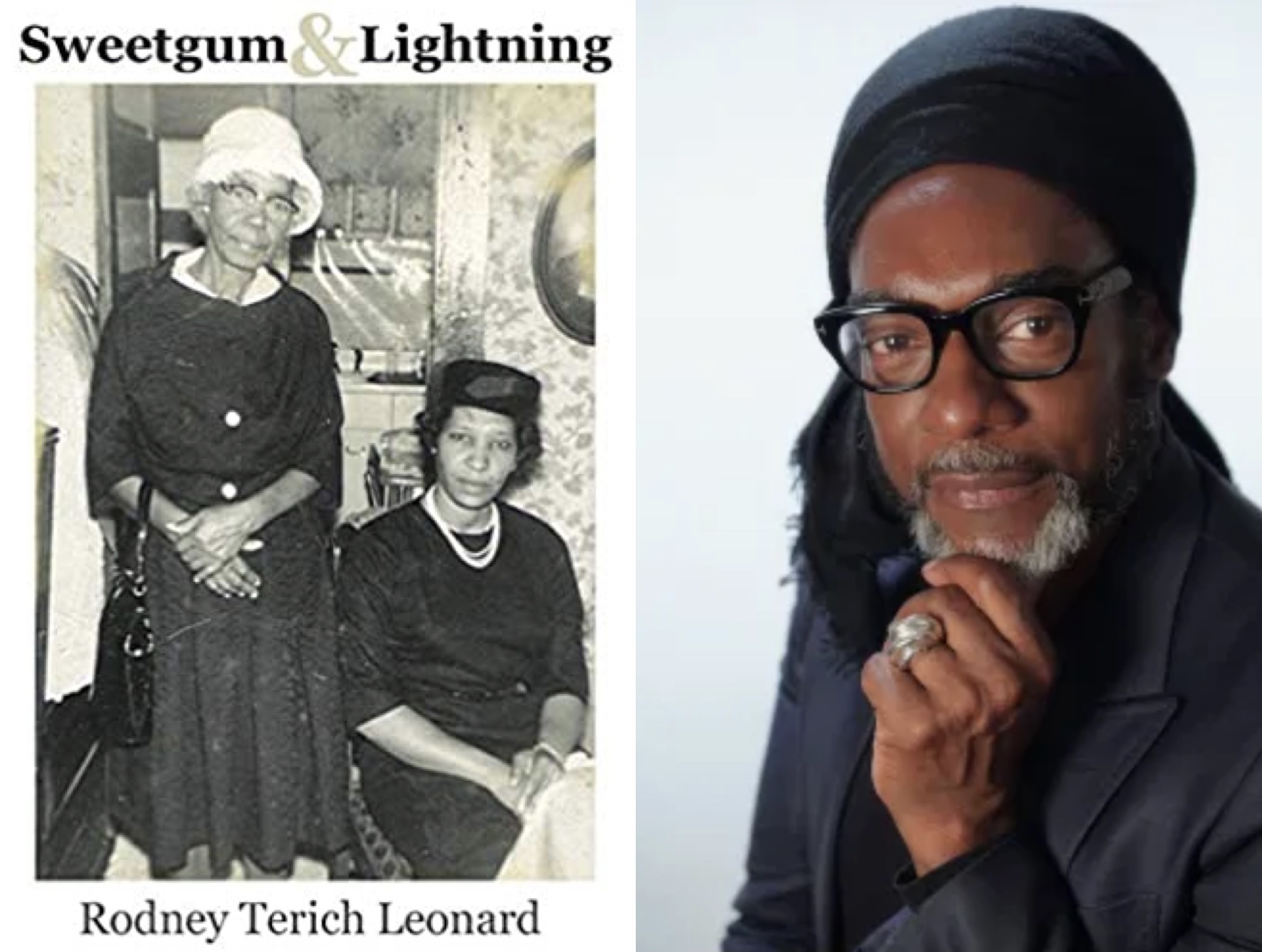
Read three Poems by Rodney Terich Leonard” (From BOMB magazine): https://bombmagazine.org/articles/rodney-terich-leonard/
Bio: Rodney Terich Leonard was born in Nixburg,
Alabama. An Air Force veteran who served during the Gulf War, his
society profiles and poems have appeared in Southern Humanities Review, Red River Review, The Huffington Post, BOMB Magazine, The Cortland Review, Indolent Books – What Rough Beasts, Four Way Review, The New York Times, The Amsterdam News, The Village Voice, For Colored Boys
(an anthology edited by Keith Boykin) and other publications. He holds
degrees from The New School, NYU Tisch School of the Arts, and Teachers
College, Columbia University. A Callaloo Poetry Fellow, he received an
MFA in Poetry from Columbia University and currently lives in Manhattan.
- Meeting 10: Friday, December 11th, 4:30 – 5:30 p.m.
Brittany N. Fox-Williams, Assistant Professor of Sociology, Lehman College
“Avoiding Harm and Maintaining Dignity: How Black Youth Navigate Police Encounters in NYC”
Prior work on youth–police relations examines young people’s general perceptions of the police, their differential treatment by police officers, and officers’ discretion in dealing with youth. Yet researchers have largely neglected the question of how young people attempt to shape these encounters. I address this critical gap, while also incorporating the experiences of “on track” youth and young women—two groups that are not exempt from police contact but traditionally ignored in the youth–police literature. Drawing on semi-structured group and individual interviews with 19 Black young people in New York City, I investigate the strategies they employ or subscribe to in navigating police contact. Three types of strategies emerged from my analysis: avoidance, management, and symbolic resistance. Avoidance strategies are marked by young people’s attempts to preemptively steer clear of officers on the street. Management strategies are employed by young people during police encounters to limit risk or harm, while symbolic resistance is a subtle tactic used by some youth to preserve their dignity in these interactions. This study also considers the gender differences in respondents’ approaches and offers new insights into how they assess their police interactions in an era of highly publicized incidents of police brutality.
Brittany Fox-Williams earned her Ph.D. in Sociology from Columbia University in 2020. She also holds a M.P.A. in Urban Policy from Columbia. Dr. Fox-William’s research and teaching specializations include race and ethnicity, social inequality, education, urban sociology, and research methods. Her current work examines the contours of racial inequality among youth in the U.S. education and justice systems—particularly as it concerns their interactions with authority figures.
- Meeting 9: Friday, December 4th, 4:30 – 5:30 p.m.
Sarah Ohmer, Assistant Professor of Latin American and Latino Studies,African American Studies, and Women’s Studies, Lehman College
“Axé-Ocracy in Brazil: Black Women Writers’ Spiritual, Political, and Literary Movement in São Paulo
This “popular education” style presentation will start with questions from the audience, and include interactive and reflective breaks. Focusing on Cristiane Sobral and Conceição Evaristo, two influential writers from the south of Brazil, and referencing some of their younger contemporaries such as Raquel Almeida, Jenyffer Nascimento, and Elizandra Souza, audience members will learn how black Brazilian womxn writers resist in the face of assassinations and the silencing of their spiritual, political and literary movement – #mariellepresente!
Personal anecdotes will present how Black Brazilian women’s knowledge production and values mentored the coinage of a new term: axé-ocracy (pronounced “ashay-ocracy”) – a political poetics that works to establish equity via spiritual empowerment and community building.
With examples of intersectional auto-ethnography (selections from
the article), community engagement (healing circle where writers defined
their own body of work), among other tools, we will share strategies to
articulate anti-racist, anti-sexist, and anti-homophobic
scholar-activism in the Humanities: in our publications, grant
applications, classrooms, and on campus. This audience-centered event
will engage the community to build on transnational networks in order to
break away from the European, U.S., and English-language imperialism of
knowledge. Dr. Ohmer will prompt participants to redirect the North to
North and North to South direction of scholarship to South-North and
South-South.
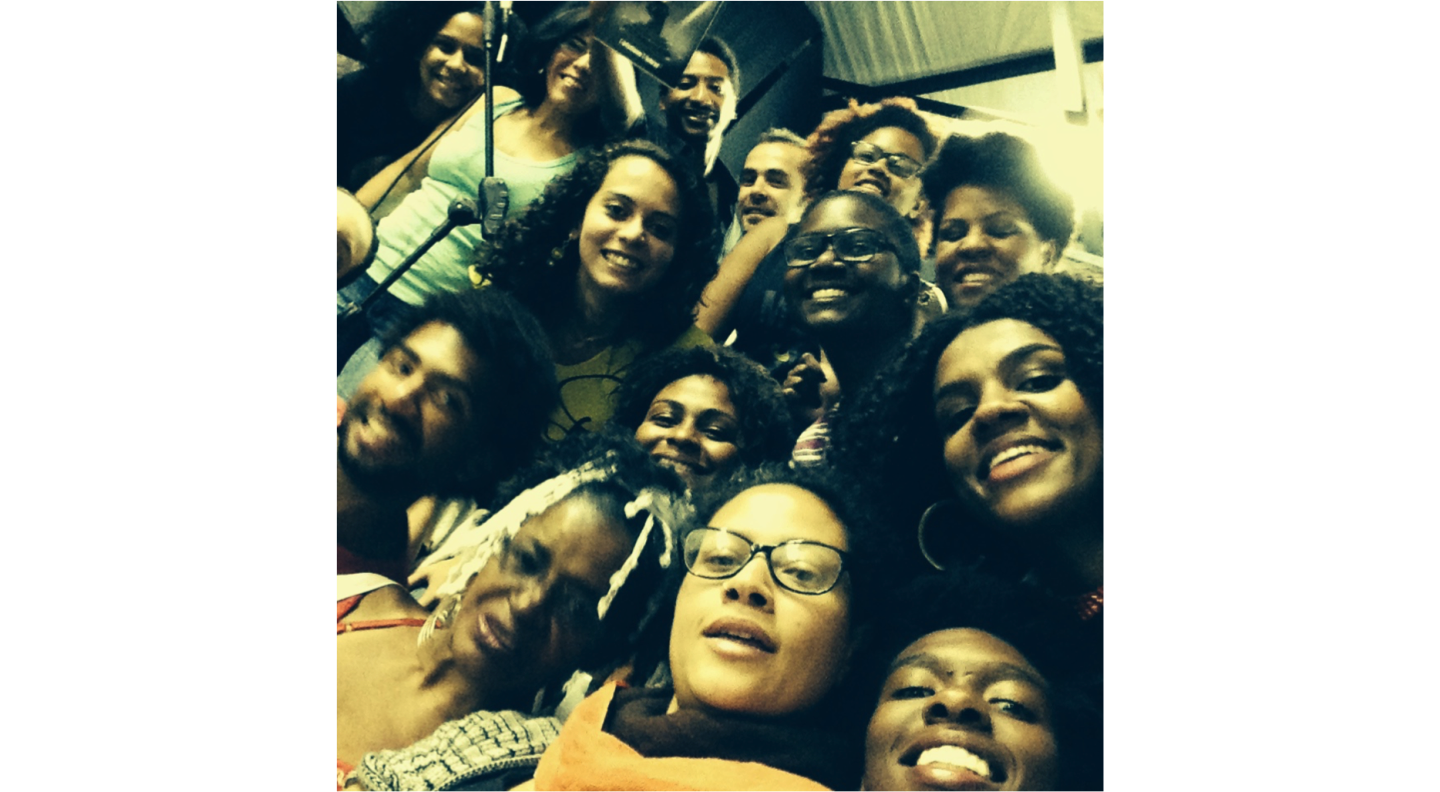
Please email [email protected] to receive a copy of the pre-circulated paper.
- Meeting 8: Friday, October 30, 4:30 – 5:30 p.m.
Mercury Fig, Searchers, and “Love is Joy Adjacent”: Creative Readings
Stacey Engels, Adjunct Lecturer, Lehman College
Yenick Gonzalez, M.A. candidate in Creative Writing, Lehman College
Justin Porter Stephens, Adjunct Lecturer, Lehman College
Joshunda Sanders, Adjunct Lecturer, Lehman College
Moderators: Lise Esdaile and Jennifer Mackenzie
Bios:
Joshunda Sanders is the author of several books, most recently the children’s books I Can Write the World (2019) and A Place of Our Own
(2021). Poetry is her first love, but her cross-genre writing in
journalism, creative nonfiction and short fiction has appeared in Bellevue Literary Review, the Oxford American magazine, Poets & Writers, Time, the Boston Globe and Bitch Media.
She is the founder and creator of a book tube channel, Black Book
Stacks, and is an adjunct lecturer in the English Department at Lehman
College, where she also works as a Communications Specialist in the
Office of the President. She’s a proud Bronx native and lives in the
South Bronx with her adorable puppy, Bendito. She has not given up on
blogging yet and you can find her intermittent musings at joshundasanders.com.
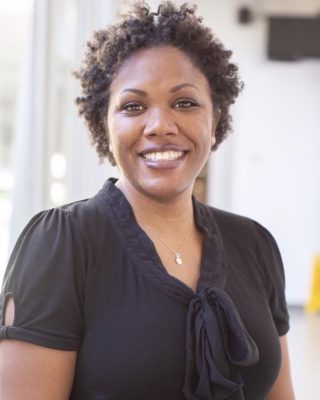
Stacey Engels is a writer, teacher and coach
based in New York City. She holds MFAs in Playwriting from The New
School and in Memoir from Hunter College and a Certificate from the
Center for Arts in Healthcare Research and Education at UF Gainesville.
An experienced consultant, program director and grant writer, she has
worked at the intersection of creativity, human services and education
for twenty years. She has received grants and fellowships from the
Canada Council for the Arts, NYFA, TCG-ITI and Yaddo, among others. Ms.
Engels is an Adjunct Lecturer at Lehman College-CUNY, where she teaches
classes in writing and literature.
Yenick (Nicky) Gonzalez is a poet and master’s student at Lehman College. She is a recent Lehman graduate and an alumna of the English Honors Program, where she was a presidential scholar, a member of the Lehman Poetry Society. Latinx Alliance, CUNY Rare Books Scholar and Lehman’s Obscura literary magazine. She is a recipient of The Grace C. Croff Memorial Prize for Poetry and winner of the Leo and Roslyn Gilbert Memorial Award in May 2020. Her published works include: “Dominican York”, “The FacialScholar That Inspires”, “Electric Powder”, “Ode To My Edgar”, “I Suffer” and “Living Muse” have all been published by Obscura, Lehman’s literary magazine.
Originally from Boston, Justin Porter Stephens has lived in Brooklyn and taught English and writing at Lehman College since 2013. He’s currently finishing his novel, Searchers, about a 90s pop culture and nostalgia shop set in post-apocalyptic Manhattan.
- Meeting 7: Friday, October 16, 4:30 – 5:30 p.m.
Sister Love, Ericka Huggins, Spiritual Activism, and the Black Panther Party
Mary Phillips, Lehman College
Description:
Historian Mary Phillips will be discussing a chapter from her book, Sister Love: Ericka Huggins, Spiritual Activism, and the Black Panther Party, (under contract with New York University Press), the first and only biography of Black Panther Party veteran Ericka Huggins. She will be discussing her chapter, “Surviving Solitary,” which charts the less familiar prison narrative of Huggins in solitary confinement and her resistance involving physical and spiritual wellness. Huggins’s incarceration exemplifies the critical role of spiritual growth and its interconnections with social activism in the lives of Black women political prisoners. Through an analysis of her prison conditions, state surveillance, and the violence she and other Black Panther Party women suffered by prison guards, Mary Phillips unearths Huggins’ journey of spiritual enlightenment and self-discovery inside prison walls. Her book reshapes the public memory of the Black Panther Party from a story of hate and Black male criminality and recasts it in a new way that center’s women’s prison organizing, resistance, and collision with law enforcement. It offers a new model for understanding the Black Panther Party and Black Power through care work and healing.
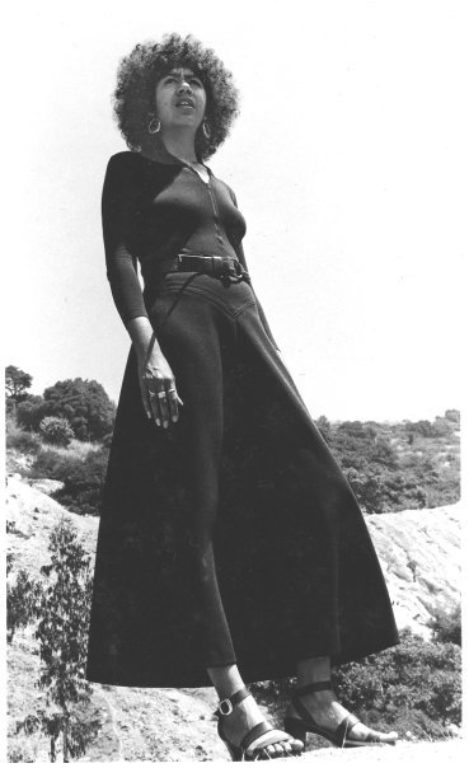
- Meeting 6 :Friday, October 2, 4:30-5:30 p.m.
“Centering Contemporary Global Literature in English Studies”
Sonia Adams- Queensborough Community College and St. John’s University, Adjunct Professor
Nadia Kalman- Editor and Curriculum Designer, Words Without Borders Campus (wwb-campus.org.)
Description:
College courses featuring literature by international writers of color are often relegated to Ethnic Studies and Comparative Literature Departments. English Studies programs that offer courses in international literature are often centered on canonized male authors and features Euro-centric perspectives, literary periods, and cultural aesthetics which result in marginalizing Black, Indigenous, and People of Color (BIPOC). The City University of New York has accepted the charge to establish a Commission to revitalize its Ethnic Studies programs through revamping its objectives and objectives and expanding its curriculum standards on race and social justice. This initiative should also be undertaken by English Studies Departments. English Studies can foster social justice intervention through pedagogical and curricular reform. It also offers possibilities for transforming student learning in the classroom. This panel advocates for such intervention and possibilities through contemporary global literature by BIPOC authors. Panelist Nadia Kalman will discuss her work with the Words Without Borders organization that connects educators and students to literature by a diverse array of contemporary authors around the world. Panelist Sonia Adams will share pedagogical and curricular approaches to teaching contemporary global literature centered on BIPOC voices and experiences.
- Meeting 5: Friday, September 18, 4:30-6:00 p.m.
Fred Johnson, with Karl Johnson: “My 15 Mississippi Days in 1964,” a memoir piece about Freedom Summer
Fred Johnson is a retired social worker and a long-time social justice activist. In the 1960’s and ’70’s, he was heavily involved in the Civil Rights Movement and the movement to end the war in Vietnam. In subsequent decades, he was active in a range of causes, and was one of the leaders of The Committee for Non-Intervention, a New York-based advocacy organization that worked to end U.S. backing of repressive regimes in Central and South America. He is also a former professional acrobat who trained an all-girls champion unicycle team in the 1990’s, as well as a writer. He is the author of the book The Tumbleweeds.
Karl Johnson is a freelance writer and editor in New York City. He was a newspaper reporter and editor for many years, and is the author of the book The Magician and the Cardsharp. He is also Fred Johnson’s nephew.
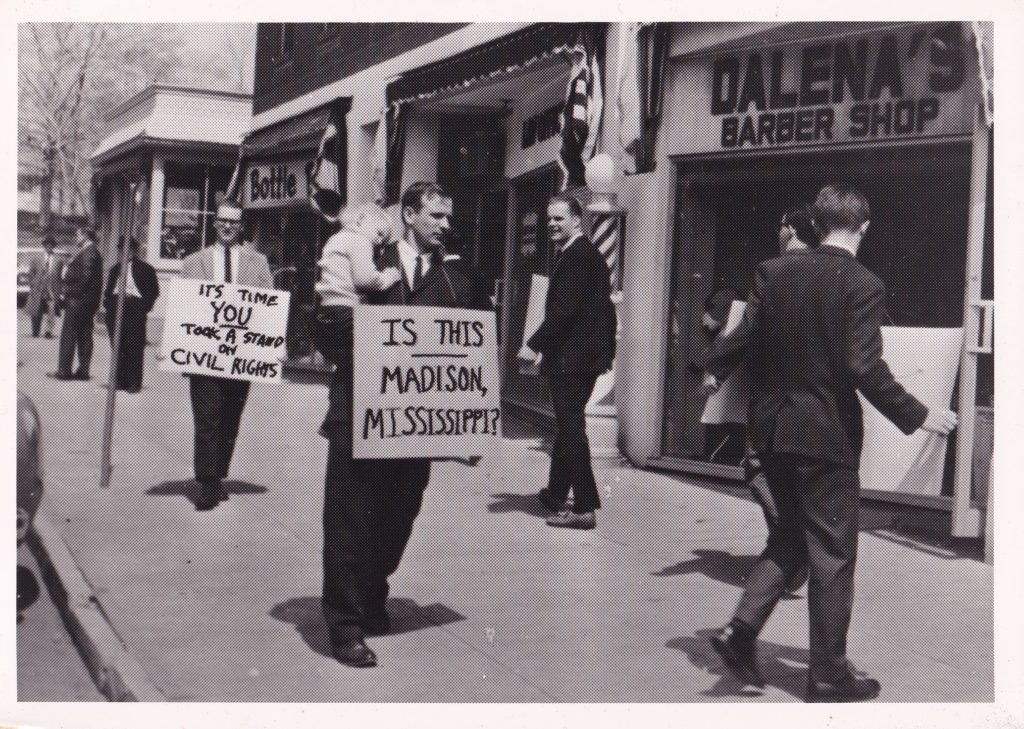
- Meeting 4: Friday, August 21, 2020, 4:30-6:00
Wendy Xin, “The Secret Lives of Plot”
Wendy Veronica Xin is a lecturer in English at NYU. She received her PhD in English from Berkeley, and has previously been a Visiting Assistant Professor of Literature at Sarah Lawrence. Her current book project is titled The Secret Lives of Plot, and her work has appeared in NOVEL: A Forum on Fiction, New Literary History, and Victorian Studies, among others. Most recently, she has taught courses that cover “Realism and the Sense of an Ending,” “The Poetics of Place: Nostalgia and Narrative Space,” “On Style: Making Aesthetic Judgements in Everyday Life,” and a Mellon funded seminar at Berkeley, “Moving through Loss: Mourning, Gesture, and the Performance Arts,” where featured student trips to see the Mariinsky Ballet, Alvin Ailey, and lots of opera. In advance of today’s seminar, please email our seminar coordinators for a copy of Wendy’s pre-circulated preface.
Melissa Castillo-Planas, “A Mexican State of Mind: New York City and the New Borderlands of Culture”
Melissa Castillo Planas is an Assistant Professor of English at Lehman College, specializing in Latinx Literature and Culture. She is the author of the poetry collection Coatlicue Eats the Apple, editor of the anthology, ¡Manteca!: An Anthology of Afro-Latin@ Poets, co-editor of La Verdad: An International Dialogue on Hip Hop Latinidades and co-author of the novel, Pure Bronx. Her most recent book project, with Rutgers University Press’ new Global Race and Media series (March 2020), A Mexican State of Mind: New York City and the New Borderlands of Culture, examines the creative worlds and cultural productions of Mexican migrants in New York City. Her second poetry collection Chingona Rules is forthcoming with Finishing Line Press.
- Meeting 3: Friday, August 7, 2020, 4:30-6:00
Roundtable on Equitable Online Teaching:
With Lise Esdaile, Mary Phillips, Michael Cotto, David Hyman, Sophia Hsu, Melissa Castillo-Planas, Olivia Moy
- Meeting 2: Friday, July 24, 2020, 4:30-6:00
Hank Williams, “Street Griots: Voices from Harlem’s Black Arts”
Hank Williams currently teaches in the Departments of English and Africana Studies at Lehman College. His regular courses are Contemporary Urban Writers, Intro to Africana Studies, Fieldwork in the African American Community, and African American History. His research focuses on the Black Arts and Black Power Movements of the 1960s-70s and the intersection of art, politics, and sound. Today’s presentation is an excerpt from his in-progress dissertation on the artist-activist collective The Last Poets, also titled “Street Griots.” In this presentation, he charts their emergence from Harlem in the 1960s and examines the tensions coming from being politically committed artists.
Sophia Hsu, “Novel Populations and the Fiction of Counting”
Sophia Hsu is an assistant professor of English at Lehman College, CUNY. She is currently working on a book project that focuses on representations of the population in the Victorian novel. Her presentation today comes from the first chapter of that project, which argues that the emerging concept of the population in the nineteenth century changed how individuals saw themselves in relation to the social whole.
- Meeting 1: Friday, July 10, 2020, 4:30-6:00
Michael Cotto, “African American Existential Heroes: Narrative Struggles for Authenticity”
Michael Cotto is an Adjunct Associate Professor of English at Lehman College and the author of the dissertation African American Existential Heroes: Narrative Struggles for Authenticity. He specializes in 20th Century African American literature and philosophy of literature. The topic of his presentation focused on the existential crises of the main characters’ in Richard Wright’s The Outsider, Ralph Ellison’s Invisible Man, and James Baldwin’s Go Tell It on the Mountain respectively in order to argue that each of the author’s engages in the existential enterprise of authenticity. To make that case for the presentation, the author of the dissertation read passages from his dissertation focusing on Wright’s main character, Cross Damon, who the author argued, suffered from existential inauthenticity.
Olivia Loksing Moy, “Reading in the Aftermath: An Asian American Jane Eyre”
Olivia Loksing Moy is Assistant Professor of English at Lehman College and the author of The Gothic Forms of Victorian Poetry (Edinburgh University Press, 2021). Today’s presentation uses the historical figure of Afong Moy to explore the difficulties and possibilities of making connections within Victorian Studies and critical race theory. Drawing on passages from Patricia Park’s Re Jane (2015), a contemporary afterlife of Charlotte Brontë’s Jane Eyre, she poses the idea of reading in the aftermath of Victorian empire and American racism — particularly in the context of a recent article on “Undisciplining Victorian Studies” in the Los Angeles Review of Books by Ronjaunee Chatterjee, Alicia Mireles Christoff, and Amy R. Wong.
Activism in Academia IV: Adjuncts in Dialogue & Action is co-sponsored bythe Gittell Urban Studies Collective at the Graduate Center, CUNY, the URBAN Research Network, and the Center for the Humanities at The Graduate Center, CUNY.
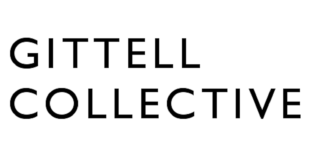


Participants
Related Events
Colloquium
Activism in Academia V: Friday Forums | Honors Research Colloquium

Conversation
Audre Lorde Great Read – “Zami: Talkback & Testimonials”

Lecture
Kandice Chuh on “stretching time, making space, or, the metaphysics of teaching”

Workshop Series
Just Research: Study, Struggle, Solidarity – Vol 2
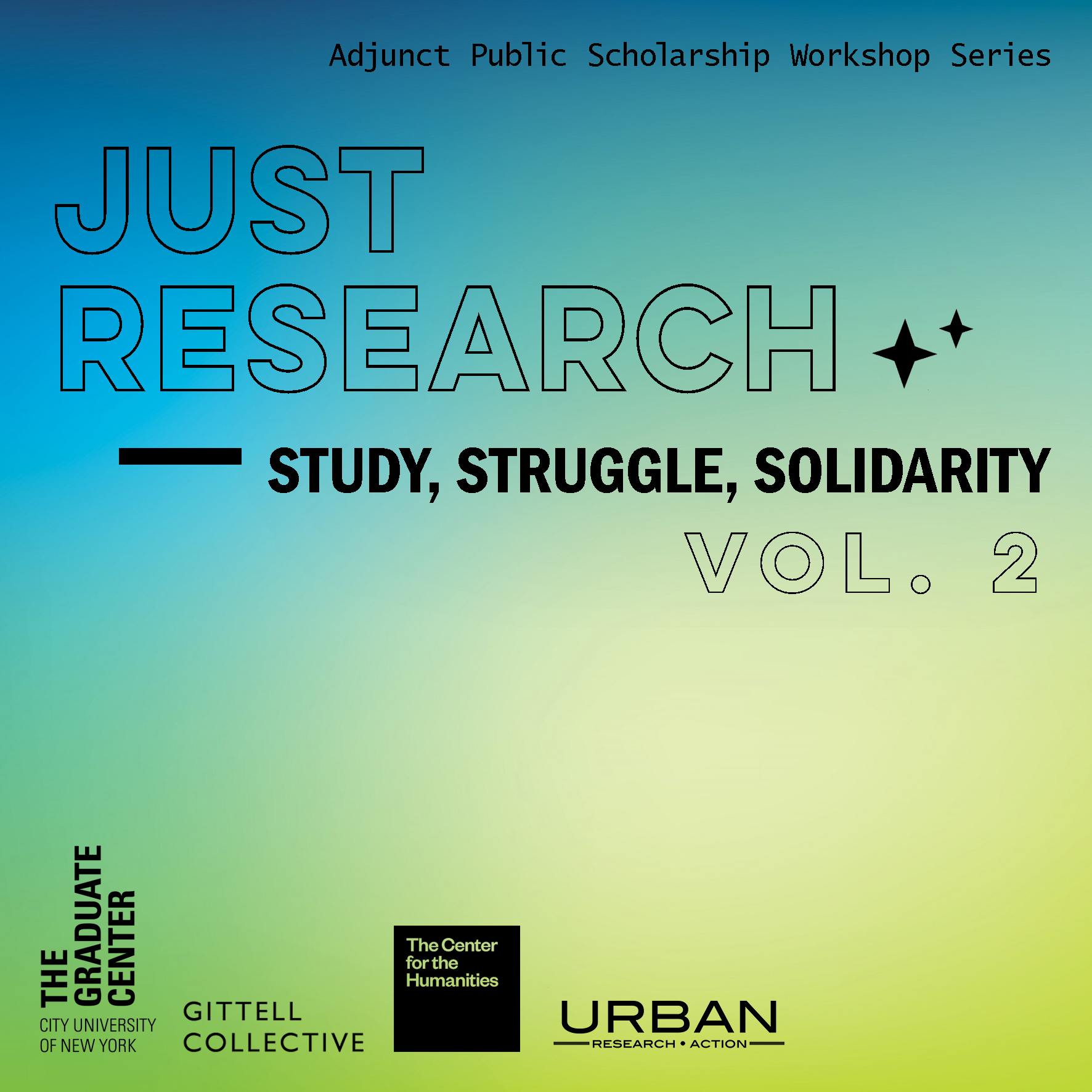
Conversation & Reading
Poems as Songs that ‘Send’ Us: ‘Black Language & Music’ in Kevin Young’s African American Poetry: 250 Years of Struggle & Song

Conversation & Reading
Black Cuir Revolutions: Reflections on Brazil, Colombia, Cuba, and the Bronx (part of the Audre Lorde “Great Read” at Lehman College)
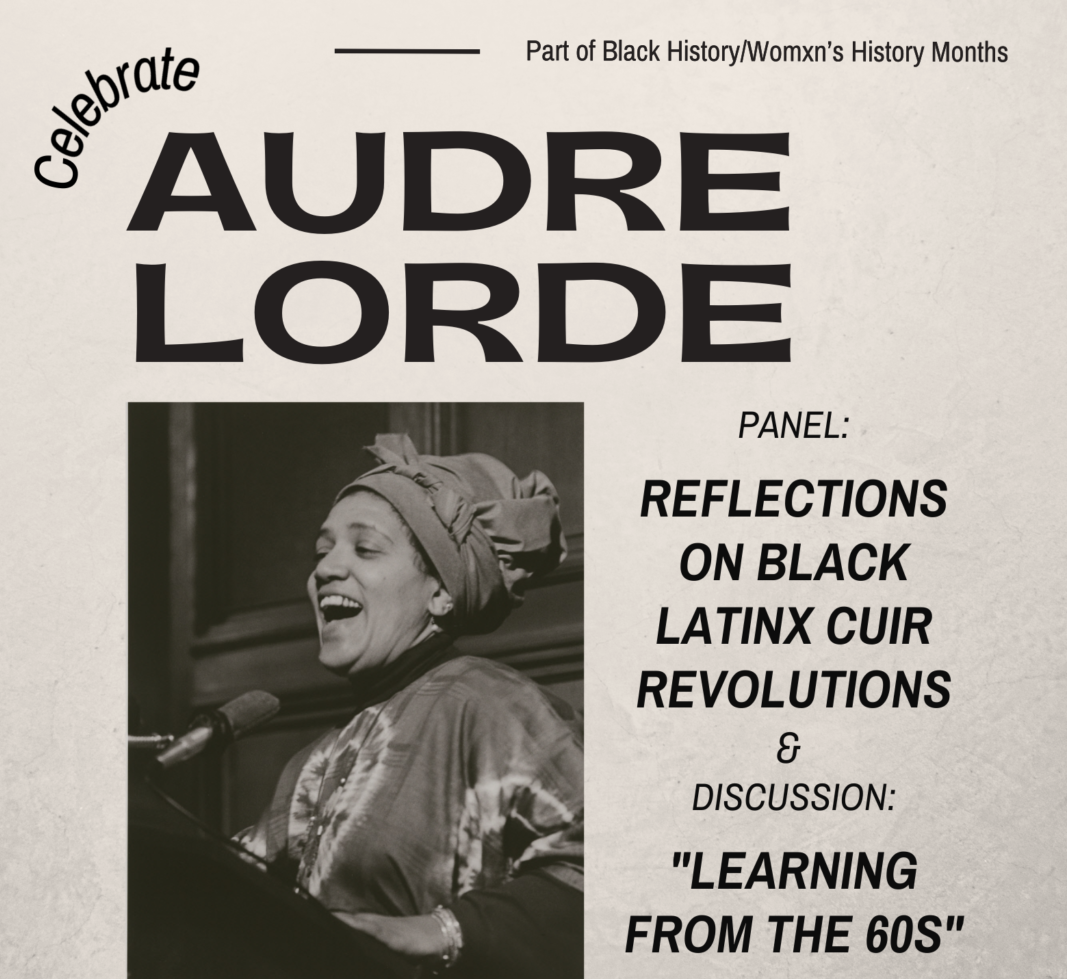
Event
CUNY Black~Puerto Rican~Third World Feminist Studies Now with Johanna Fernández, Carmen Kynard, & Vani Kannan
